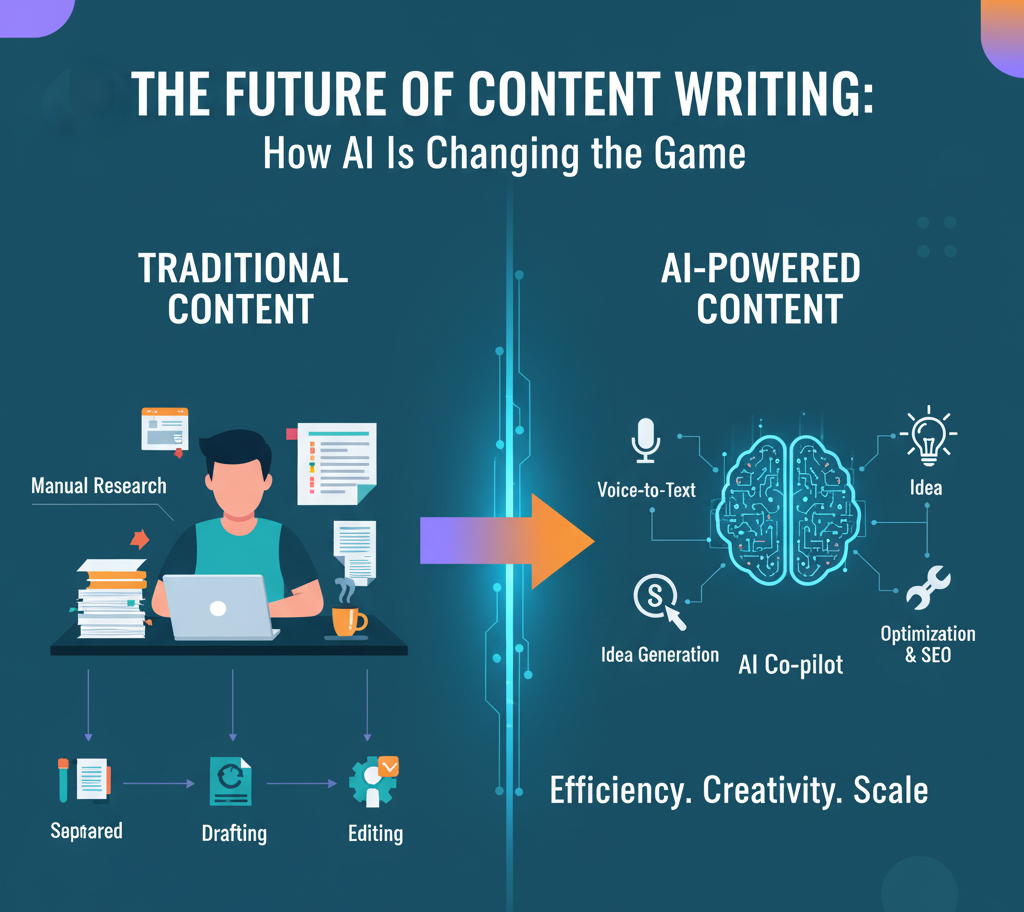The New Era of Content Creation Has Begun
The way we create, share, and consume content is undergoing a massive transformation and at the center of it all is artificial intelligence. What used to take writers hours of research and editing can now be done in minutes with the help of AI-powered tools. The future of content writing is no longer about typing faster; it’s about thinking smarter.
AI has quickly evolved from a supporting tool to a creative partner. From generating blog outlines and headlines to optimizing SEO and even writing entire articles, AI is reshaping the way we approach storytelling. But with this transformation comes a mix of excitement, opportunity, and uncertainty. What will the writer’s role look like in a world where machines can “write”?
Let’s explore how AI in content writing is changing the game and what it means for professionals and brands in the years ahead.
From Manual Drafting to Machine Assistance: How We Got Here
Not long ago, writers relied solely on experience, creativity, and endless cups of coffee. Then came digital tools Grammarly, SEO analyzers, and research assistants that made writing faster and smarter. The next big leap arrived with AI-powered language models, capable of understanding context, tone, and audience intent.
These tools don’t just assist; they accelerate. They can generate blog drafts, product descriptions, and social media posts in seconds. Businesses use AI to scale content creation, while writers use it to streamline brainstorming and editing.
The rise of tools like ChatGPT, Jasper, and Copy.ai marks a shift from human-only writing to human–AI collaboration. Writers now act as editors, strategists, and storytellers, shaping machine-generated text into authentic, engaging narratives.
Creativity Reimagined: Why AI Won’t Replace Human Writers
Despite all the buzz, AI won’t make writers obsolete at least not the good ones. What AI lacks is emotional depth, lived experience, and cultural understanding the very elements that make storytelling powerful.
A machine can imitate empathy, but it can’t feel it. It can produce thousands of words, but it can’t understand why a message moves people. The future of content writing belongs to those who can blend human insight with AI precision.
In practice, AI will handle data-heavy or repetitive tasks, while humans will focus on creative direction, emotional tone, and strategic storytelling. The most successful writers will be those who know how to collaborate with AI rather than compete against it.
SEO in the Age of Algorithms: How AI Shapes Search-Optimized Content
Search engine optimization is evolving alongside AI. Modern AI tools now understand Google’s algorithms better than ever, offering insights into search intent, keyword variations, and topic clustering.
Writers can use AI-powered SEO tools like SurferSEO, Clearscope, or MarketMuse to analyze top-ranking pages and craft content that satisfies both readers and search engines. AI can even predict how likely a piece of content is to rank before it’s published.
However, while AI can guide optimization, quality still reigns supreme. Google’s algorithms increasingly reward original thought, expertise, and user value. That means the best content will come from writers who use AI as an assistant not as a replacement to enhance their human expertise.
Ethics and Authenticity: The New Challenges of AI Writing
With the rise of AI in content writing come important ethical questions. Who owns AI-generated content? Should audiences be told when an article was created with machine assistance? How do we prevent misinformation or plagiarism when AI can generate convincing but inaccurate text?
Transparency will be key in the future of content writing. Brands must ensure AI-generated material is fact-checked and authentic. Writers should disclose when they’ve used AI tools, especially in industries like health, finance, or law where accuracy matters most.
Equally critical is maintaining brand voice and originality. Overreliance on AI can make content feel generic or mechanical. To stand out, writers will need to infuse AI-generated drafts with their unique tone, perspective, and storytelling flair.

The Writer’s New Skill Set: Adapting to an AI-Driven Landscape
As AI becomes an integral part of content creation, the writer’s role is evolving. Future writers will need a combination of creative, technical, and analytical skills.
They’ll need to understand how AI tools work, how to prompt them effectively, and how to edit machine-generated text for clarity and engagement. They’ll also need to interpret data insights understanding which topics perform best and why.
The most in-demand professionals will be AI-literate writers who can combine creative storytelling with algorithmic awareness. In other words, the future content expert isn’t just a writer they’re a strategist who uses AI to amplify their creative output.
Conclusion: The Future of Content Writing Is Human at Its Core
AI has already changed how we create content but it hasn’t changed why we create it. Great writing will always be about connection, understanding, and storytelling. The future of content writing lies not in replacing human voices, but in enhancing them with intelligent tools that make creation smarter and more strategic.
For content creators, marketers, and businesses, the goal is clear: embrace AI to streamline your process, but never lose the human essence that makes words powerful.
And for freelancers or remote writers eager to explore this new frontier, platforms like Wiraa offer opportunities to connect with clients and projects that value both technology and creativity. The future belongs to those who can blend the two crafting content that informs, inspires, and endures.




